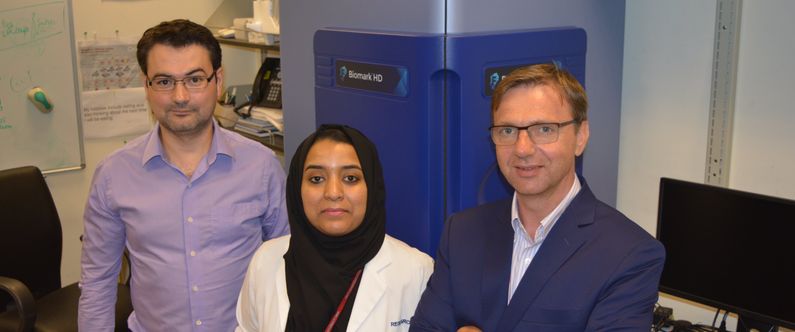WCM-Q gains certification to use powerful new research tool
 WCM-Q researchers Dr. Rudolf Engelke, left, Hina Sarwath and Dr. Frank Schmidt with the new Olink equipment.
WCM-Q researchers Dr. Rudolf Engelke, left, Hina Sarwath and Dr. Frank Schmidt with the new Olink equipment.
Weill Cornell Medicine-Qatar (WCM-Q) has joined an elite group of research centers around the world that are certified to use a powerful new research tool for investigating the complex roles of proteins in human disease.
The technology, provided by Swedish bioscience company Olink, allows researchers to analyze vast numbers of different proteins in one go as they hunt for so-called ‘biomarkers’ of disease – particular proteins or combinations of proteins found in samples of blood, saliva or other tissue that indicate health issues. Identifying these ‘biomarker’ proteins improves the researcher’s understanding of how a range of diseases function and potentially makes it possible to develop new diagnostic tools to catch diseases earlier, create personalized treatment plans, improve the accuracy of prognosis, and – crucially – facilitate the design of new drugs that target the proteins that cause disease.
The study of all identifiable proteins as a whole – also known as proteomics – is regarded as one of the most promising fields of biomedical research for the development of new treatments for an almost limitless range of diseases, including diabetes, cardiovascular disease and various forms of cancer. Including the new proteomics platform now established at WCM-Q, there are just 12 certified Olink service providers in the world, three of which are in the US and eight in Europe.
Dr. Frank Schmidt, Director of the Proteomics Core at WCM-Q said: “This technology is extremely powerful and gives us wonderful new capabilities for analyzing proteins that cause disease. Qatar is the first country outside of the US and Europe to gain certification as an Olink service provider, so this establishes Qatar and WCM-Q as regional and global leaders in the field of proteomics research.”
The Olink platform gives researchers the ability to conduct ‘multiplexed’ protein analyses, meaning they can simultaneously observe multiple proteins involved in complex relationships with one another, giving greater insight into how these interactions give rise to disease. This technology is also described as ‘high-throughput’ capable, meaning researchers can perform a very large number of tests in a short time-frame.
WCM-Q’s Research Program is already a regional center of excellence for research in a variety of areas and is endowed with state-of-the-art equipment and staffed by some of the world’s leading scientists in their fields. The Olink technology enhances WCM-Q’s capacity to drive research forward and improve understanding of many debilitating diseases. This augments pre-existing core facilities at WCM-Q that provide technical and instrumental support in several areas, including genomics, biostatistics, bioinformatics, metabolomics (study of the metabolism), and cellular imaging.
WCM-Q Instrumentation Supervisor Dr. Rudolf Engelke said: “The new platform greatly expands our analytical portfolio and gives us the ability to understand how proteins are connected to different diseases like diabetes, which is a key concern in the Gulf region. We are extremely excited about the research we are now able to conduct here and the contributions we will be able to make, hopefully leading to improved diagnostic and treatment outcomes for patients in the future.”
The technology also means WCM-Q will be able to conduct cross-disciplinary research by comparing data from proteomics studies with those of genomics and metabolomics.
Dr. Karsten Suhre, Director of the Bioinformatics Core and Professor of Physiology and Biophysics at WCM-Q said: “With the Olink platform we add yet another cornerstone to our already broad analytical capabilities to investigate complex diseases on a molecular level.”
Dr. Khaled Machaca, WCM-Q Associate Dean for Research and Professor of Physiology and Biophysics said: “We are excited about the expansion of our core capabilities with the addition of the Olink platforms, especially as this service - like all of our cores services - is available to all national stakeholders in Qatar. These national cores at WCM-Q support biomedical research right across Qatar.”
